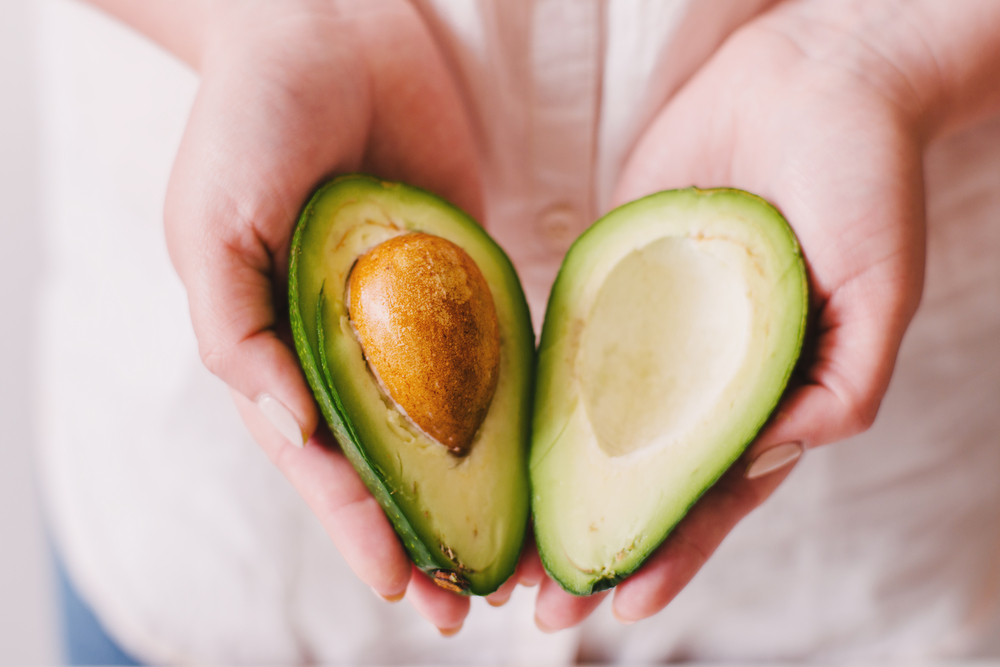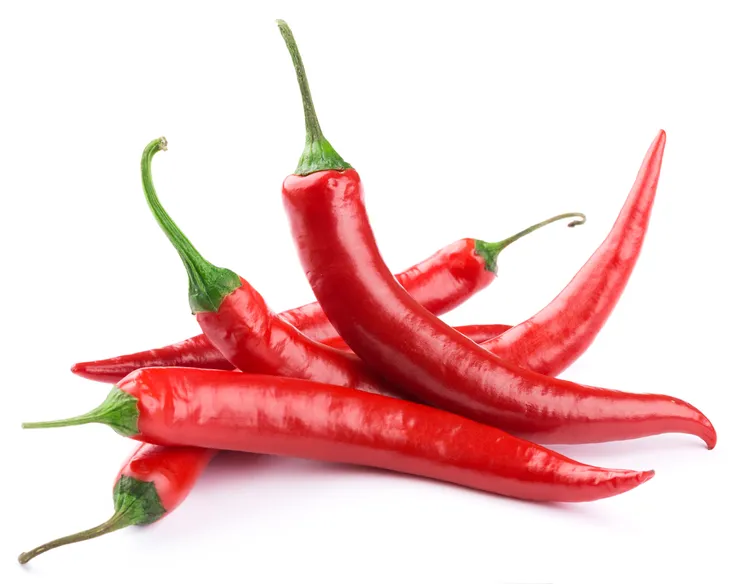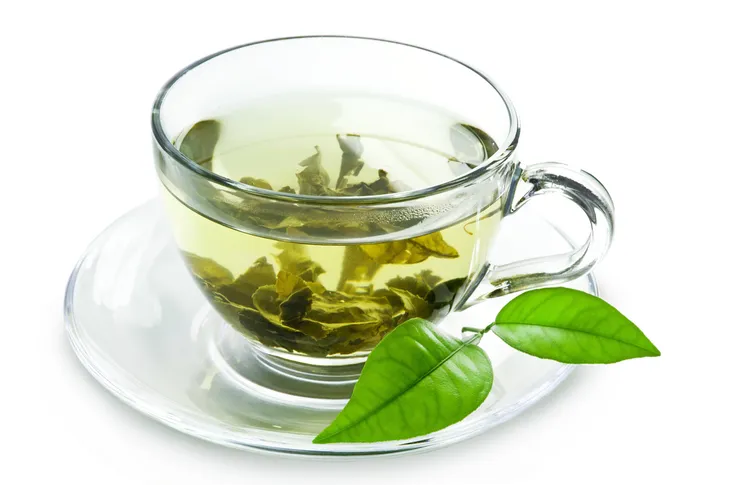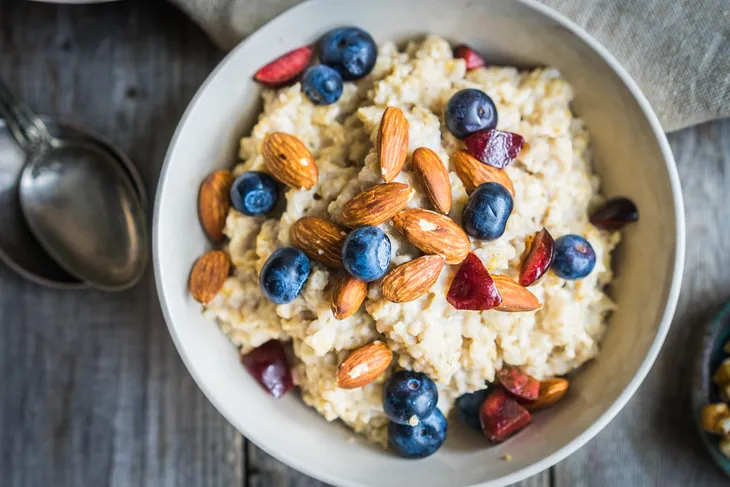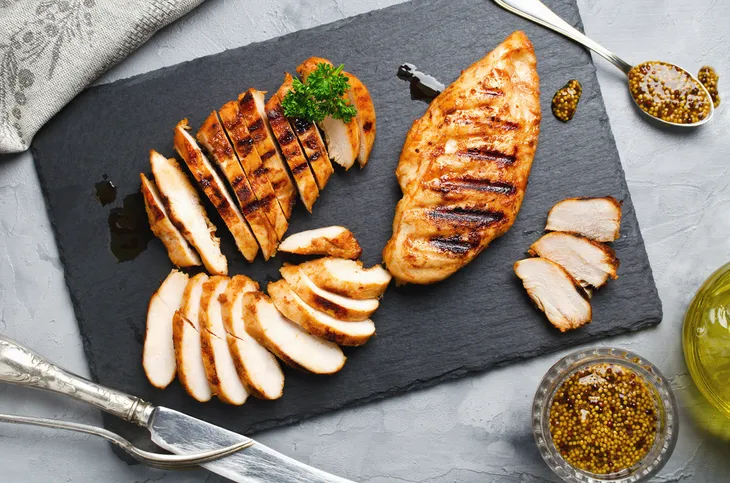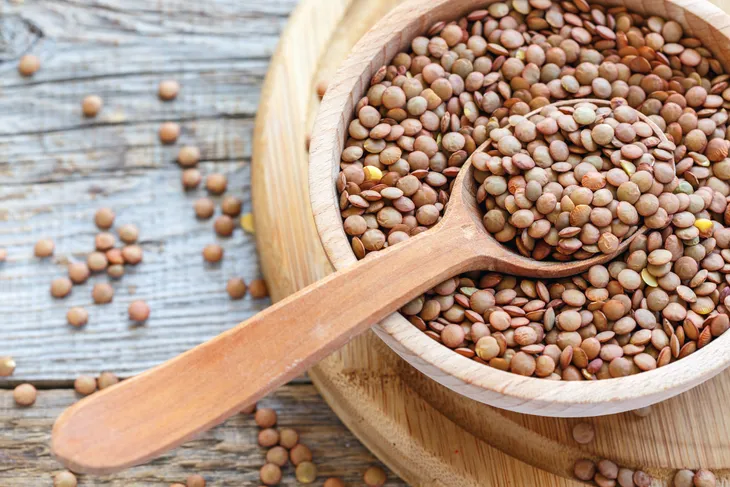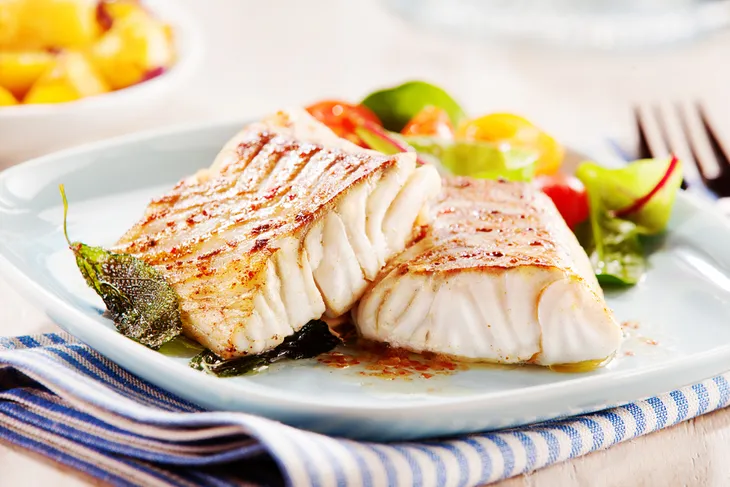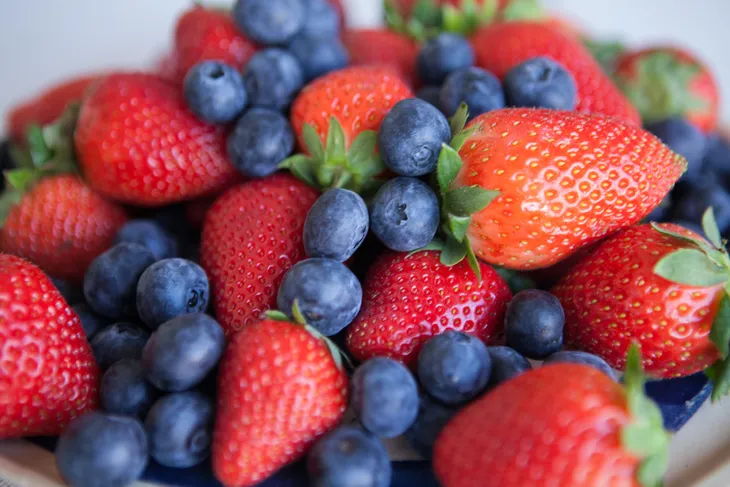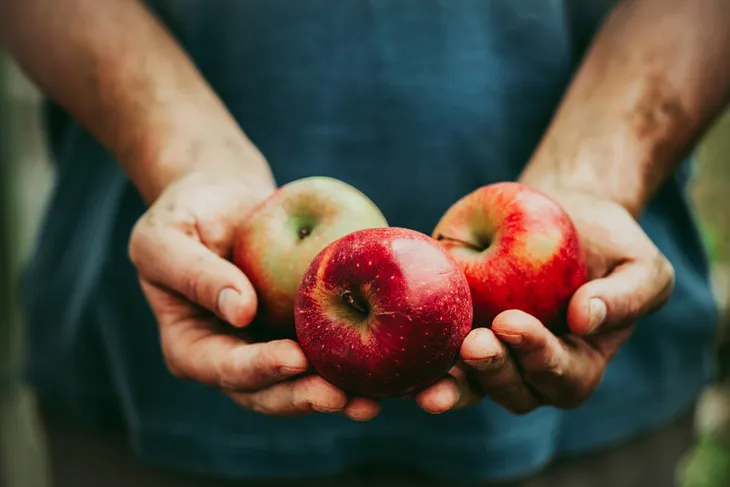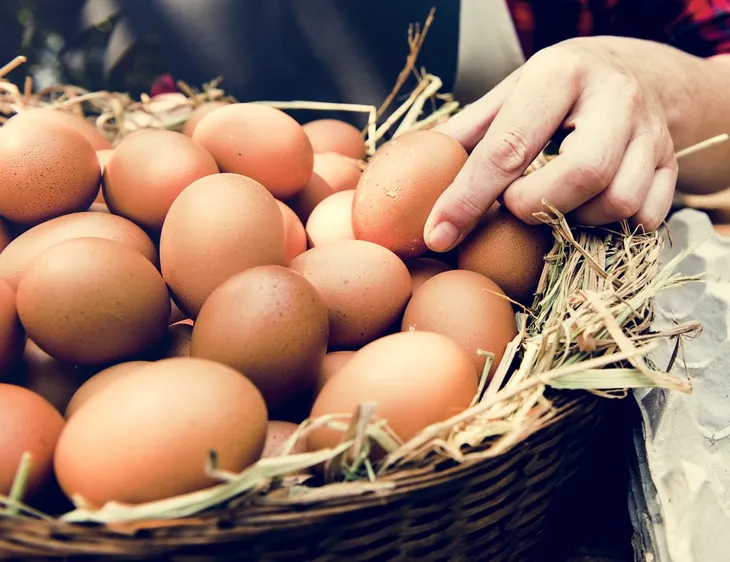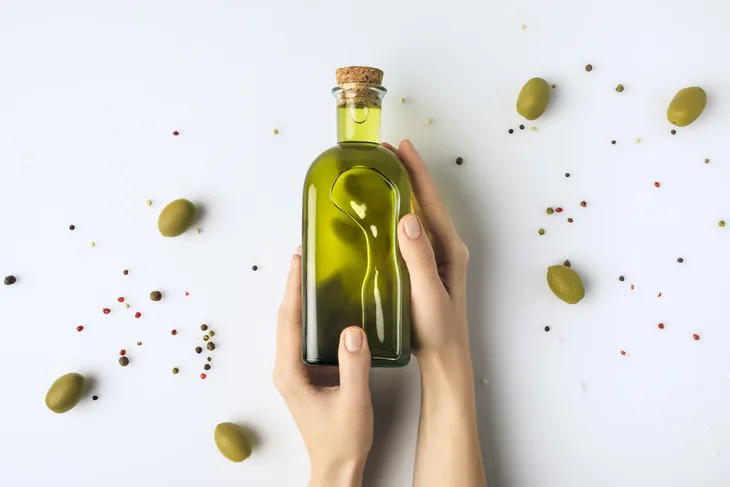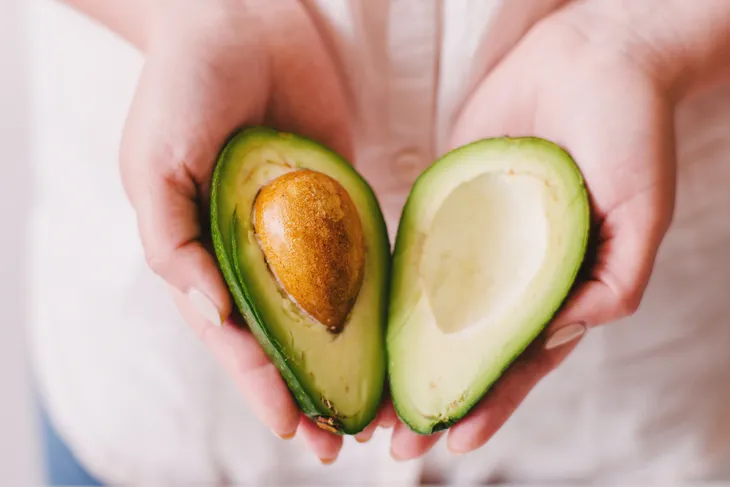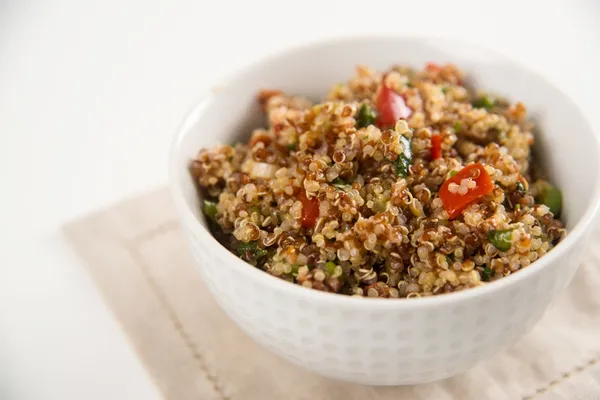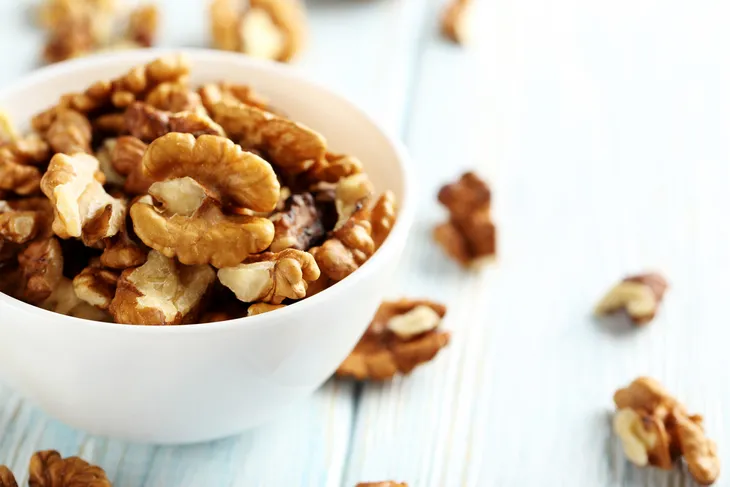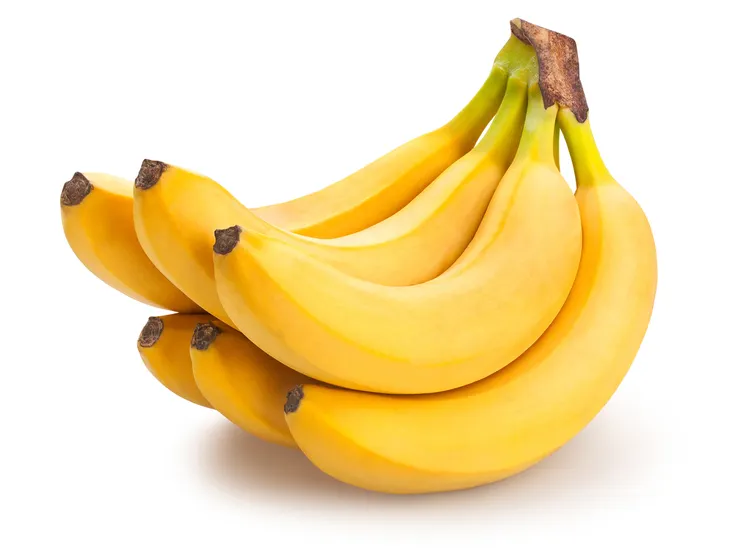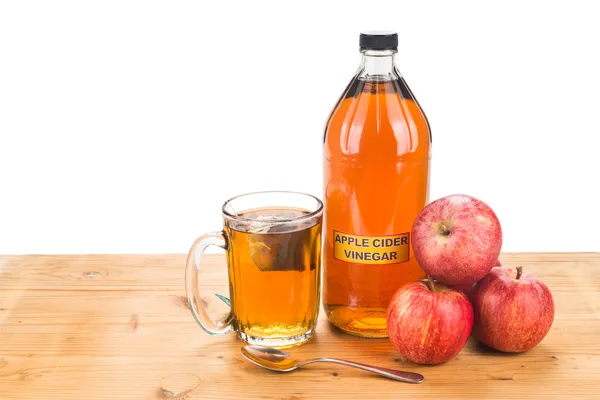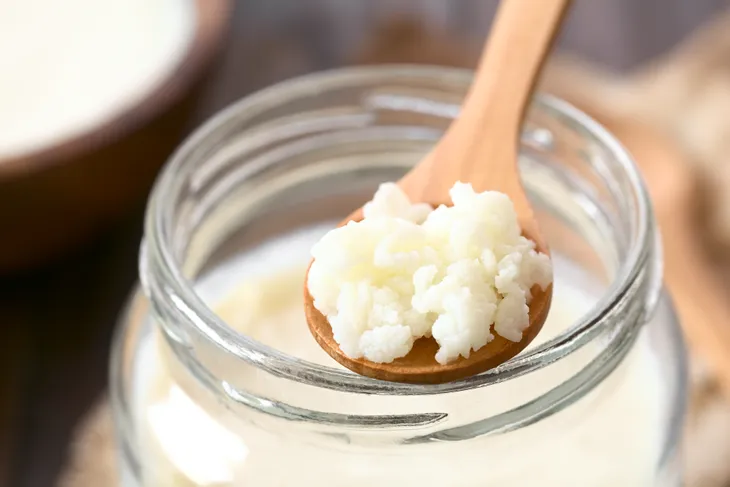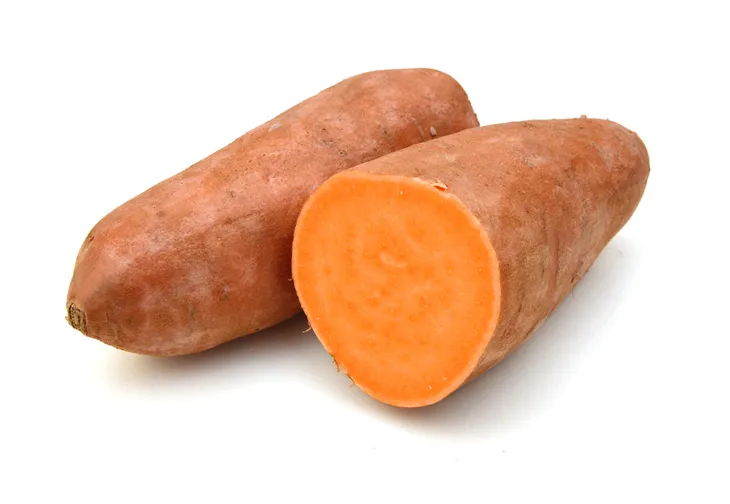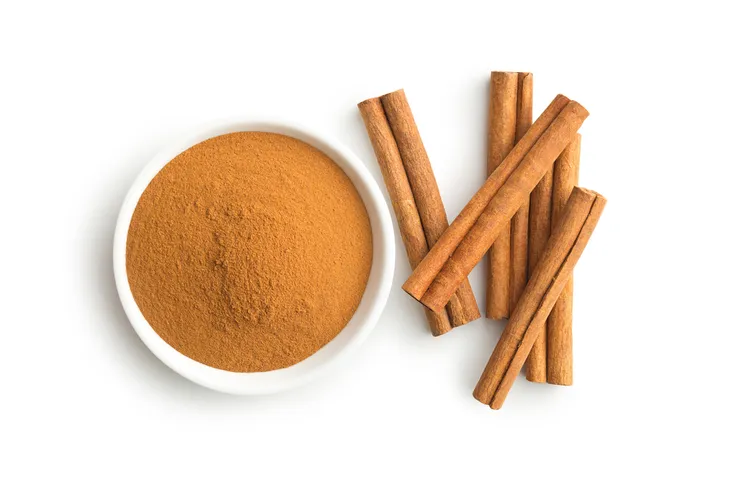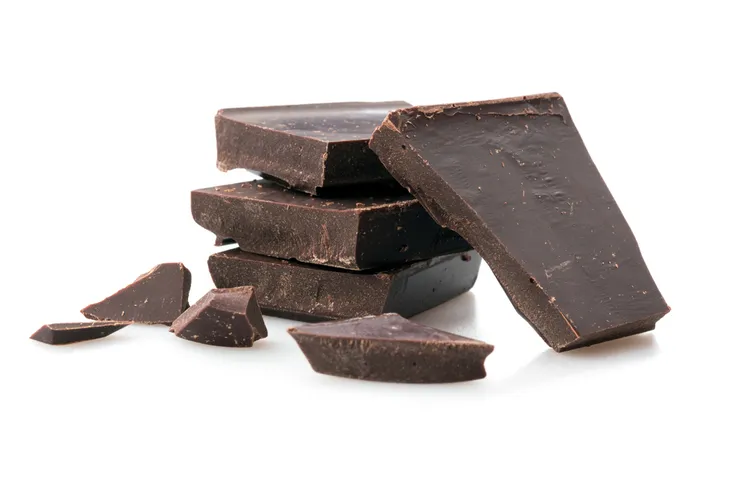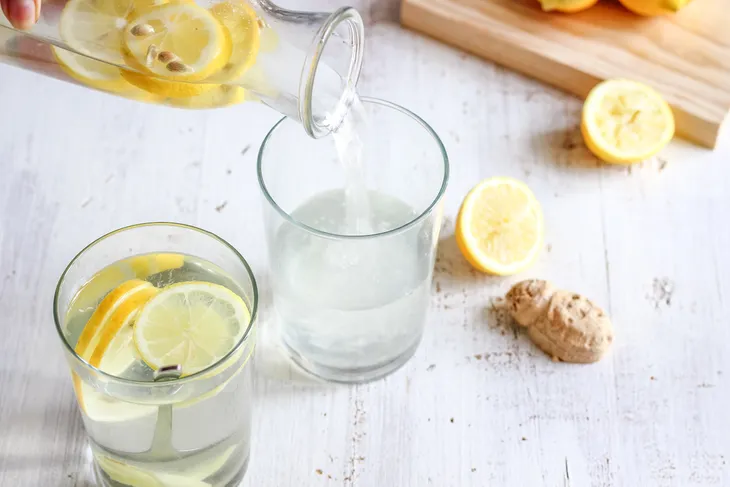Maybe you already knew that particular foods contain high thermogenic effect, which essentially means they help to boost your metabolism. However, the majority of the population has no idea exactly what foods burn calories as you chew, or contain particular nutrients and compounds that fuel your body’s internal metabolic furnace and help you literally melt the calories you consume far more quickly.
Here are 25 foods that nutritionists credit with helping you burn fat…
Want diet & nutrition content delivered straight to your inbox? Sign up for our exclusive diet & nutrition newsletter!
1. Hot Peppers
Chili peppers sure do pack quite a bunch! They have a compound called “capsaicin” that gives them their zip and heats up the body, firing up your metabolism and helping you burn off excess calories. Capsaicin is present in fresh, pickled and dry peppers, along with flaked pepper spices like cayenne and red chilies. Weight loss experts recommend adding them to your soups, sauces, and rice dishes to boost your diet’s automatic fat-burning potential.
If you don’t like spicy food, you can still benefit from chili peppers. A recent University of California study found that peppers with a compound called dihydrocapsiate also helped study participants burn fat. Dihydrocapsiate is a non-burning (i.e. non-spicy) form of capsaicin which increases your body’s ability to oxidize fat. Researchers recommend making it a regular part of your low-calorie diet if you’re not a fan of spicy dishes – this will help you benefit from the natural fat-burning properties of chili peppers without setting your mouth on fire.
2. Green Tea
Green tea contains a substance known as epigallocatechin gallate (EGCG), which has been scientifically proven to provide your metabolism with a temporary boost. EGCG is an antioxidant which helps your body make better use of a naturally occurring hormone and neurotransmitter called norepinephrine. The main metabolism effect of norepinephrine is that it sends signals to your body, telling it to start breaking down fat cells and using their stored energy.
While green tea doesn’t contain a lot of caffeine, it does have some – about 25 to 50 milligrams per cup, on average. Caffeine synergizes with norepinephrine, enhancing its fat-burning effects. One recent study showed that men who took dietary supplements containing EGCG burned 17 percent more fat by exercising than men who didn’t. If you’re regularly exercising and eating a low-calorie diet, incorporate hot or cold green tea into your diet to kick your fat-burning regimen into overdrive.
3. Oats
Oats are very high in fiber, and when your body needs to break down fiber-rich whole foods, it burns up to twice as many calories during the digestion process. Dietary fiber also helps regulate your appetite, giving you a lasting feeling of satiation and helping ward off hunger throughout the day. This makes you less likely to reach for sugary or fatty snacks, especially in the hours between breakfast and lunch.
Experts recommend eating oatmeal for breakfast, but watch out if you’re buying quick-cooking or instant oatmeal. Many of these products contain added sugar, which will effectively neutralize its healthy effects. Instead, reach for unsweetened whole-grain oats, and add some honey or fresh fruit to boost its flavor appeal. Pair it with protein-rich nuts and you’ll have one of the healthiest breakfasts on the planet. You can also sprinkle oat bran on your soups, salads and stir fry dishes to give your body an internal workout!
4. Grapefruit
Chances are you’ve heard that one of the best fat-burning breakfasts you can eat is half a grapefruit with a cup of black coffee. This can be a great start to your day, especially if you follow it up a couple of hours later with a healthy “second breakfast,” containing fiber-rich, high-protein foods. Grapefruit helps your body dissolve fat and cholesterol, which fighting hardening of the arteries (a process known as “arteriosclerosis”).
A medium-sized grapefruit has only 74 calories, but packs a whopping 15 grams of belly-filling pectin fiber. This fiber helps you feel full for a longer period of time, regulating hunger levels throughout the day and making you less likely to snack between meals. Grapefruit it also very high in both vitamin C and potassium, and it contains absolutely no fat and no sodium. Add it to your breakfast regimen and watch your waistline shrink!
5. Lean Turkey or Chicken
Turkey and chicken are both very lean sources of protein, and both have what is known in dietary circles as a “high thermogenic effect.” In essence, this means that it fires up your body’s internal furnace during the digestion process, sending your metabolism into overdrive. Because turkey and chicken are both very low in fat, they are also much lower in calories than fattier meats like beef and pork. It’s a win-win situation for your body, which gets all the nutrients and benefits of meat from far fewer calories, all while burning more energy during digestion.
However, turkey and chicken both come with an important caveat. If you want to maximize the fat-burning potential of these meats, it’s important to take the skin off. Poultry skin is very high in fat, and it will significantly alter the nutrition content of the meat. Get rid of it, and flavor the meat with spices or low-calorie, low-sugar sauces.
6. Lentils
By now, you’re probably noticing a trend – the higher a food’s protein content, the better it is for weight loss. Your body has to spend more calories breaking down protein, making it automatically better for burning fat, and it also takes your body longer to digest protein. This leaves you feeling fuller for a longer period of time, and studies have shown that people eating high-protein diets consume far less calories during an average day than people on lower-protein diets.
Lentils are an excellent choice because they are very high in protein, yet very low in fat. In fact, they have one of the lowest fat contents of any protein-rich food. A single serving of lentils also provides for 35 percent of your daily iron needs. Lentils are also low in sodium and very high in potassium. Few foods offer the nutritional punch of low-calorie lentils. Add them to your soup recipes, or put them in regular rotation as a side dish.
7. Fish
Certain types of fish are high in omega-3 fatty acids, which promote fat loss by kicking your metabolism into high gear. The dietary action of omega-3 fatty acids is similar to that of protein – it forces your body to naturally burn more calories while helping you keep your appetite in check throughout the day. Fish is a great choice at lunchtime; the earlier in the day you eat it, the longer you will benefit from its appetite-regulating properties.
Fish also reduces your risk of heart disease, reduces cholesterol, and can help relieve arthritis and joint inflammation symptoms. A can of water-packed tuna has about 90 to 120 calories, which isn’t much considering its nutritive benefits. Salmon, mackerel and albacore tuna are all very high in omega-3 fatty acids, which may also help protect your brain and boost your cognitive capabilities. Just watch out for high mercury content; choose organic or sustainably sourced products rather than their mass-produced counterparts.
8. Berries
Berries are very rich in antioxidants, and getting more antioxidants from natural sources is a great way to help boost your metabolism. The antioxidants contained in berries promote better blood flow, which helps your body build stronger muscles. The more muscle your body has, the more calories it will burn – even when you’re at rest. Invest some time in improving your fat-to-muscle ratio and you’ll benefit from passive calorie burning and weight loss.
Another benefit of berries is that they are very low in calories. Strawberries are very low in calories, with only about 45 per cup. Raspberries, blackberries and blueberries all range between 60 and 80 calories per cup, and all four types of berries help keep your blood pressure down. This reduces your risk of heart disease and heart attacks – another reason to add berries to your oatmeal or whole-grain breakfast cereal. They’re also one of the best snacks you can eat.
9. Apples
You already know that “an apple a day keeps the doctor away,” but apples can also help keep the calories away as well. A few crispy bites is a safe way to elevate your blood glucose (blood sugar) levels, providing you with a nutrient-rich, low-calorie source of satisfying energy. A medium-sized apple has just 80 calories, with all kinds of antioxidants and absolutely no sodium, saturated fat or cholesterol. Like berries, apples make a great midday snack.
Given that apples are also rich in antioxidants, they can help improve your body’s blood flow and help you build healthier, stronger muscles. As a general rule of thumb, choose apples with darker skins more often. The darker an apple’s skin, the richer it is in antioxidants, and the stronger its fat-burning effects will be. However, if you strongly prefer Granny Smith or golden delicious apples, rest easy – these varieties also pack a strong antioxidant punch.
10. Coffee
Sure, caffeine has its drawbacks – excessive consumption can cause an elevated heart rate while potentially triggering anxiety and insomnia. However, moderate coffee drinkers can take solace in the fact that their morning cup of java provides a big metabolic boost, meaning that this stimulant naturally speeds up your metabolism and helps you burn more calories than normal. It also helps get you up and moving more quickly in the morning, providing your energy levels with a helpful push in the right direction.
In addition to moderating consumption, you should also be careful about what you add to your coffee. Piling on the sugar and heavy cream will turn this metabolism-boosting beverage into a fat trap. Instead, use low-fat milk and sweeteners instead of sugar, or avoid sweetening it altogether. Coffee is healthiest when it’s consumed black, so if you can make that transition, your body will thank you for it.
11. Eggs
Eggs are a common breakfast food and that’s because they offer a great way to kickstart the day with a boost of protein. While eggs used to be on the “no no list” due to their high cholesterol, this has changed because Healthline points out that eggs have actually shown to protect heart health, especially those at risk for disease. Eggs are also a good option for those looking to lose weight. They contain a high concentration of protein which helps keep us full for longer periods of time. This helps us avoid overeating or snacking on empty calories throughout the day. It also increases our metabolic rate for several hours after digestion. “One of the reasons eggs are so filling may be due to the boost in calorie burning that occurs during protein digestion,” writes Healthline.
Let’s look at the studies to prove it. Healthline cites a controlled study of 21 men which found that the men who ate three eggs for breakfast consumed 400 fewer calories than those who didn’t. They also experienced a 16-percent reduction in body fat compared to those who ate a bagel for breakfast.
According to WebMD, one egg has only 75-calories and amounts to 7-grams of protein, not to mention all it’s other amazing nutrients. This doesn’t mean you can order eggs benedict for breakfast without any guilt. Don’t pair it with carbs and sauces. There are other much healthier ways to enjoy eggs for breakfast.
12. Coconut Oil
Coconut oil is a great alternative to other unhealthy cooking oils like vegetable oil or canola oil. Not only is it better for us, but it reaps its own benefits as well! “Adding coconut oil to your diet appears to increase ‘good’ HDL cholesterol and decrease your triglycerides, in addition to helping you lose weight,” writes Healthline. “The fats in coconut oil are mostly MCT’s which have been credited with appetite-suppressing and fat-burning properties.”
The source cites a study published in ISRN Pharmacology which found that obese men who added 2-tablespoons of coconut oil into their diet every day were able to shed 1-inch off their waistline without making any other changes to their diet or physical activity. It’s important to note that some studies have found that its effects can decrease over time. It’s also not a great method to practice on its own, but rather in addition to other things like eating healthier and exercise. Start with only 1-tablespoon a day so that it minimizes digestive discomfort.
13. Olive Oil
Similar to coconut oil, olive oil is a much healthier alternative for cooking and has been touted as one of the healthiest fats available. “Olive oil has been shown to lower triglycerides, increase HDL cholesterol and stimulate the release of GLP-1, one of the hormones that keep you full,” writes Healthline. “What’s more, some studies have shown that olive oil may boost metabolic rate and promote fat loss.”
A study published in the British Journal of Nutrition looked at 12 postmenopausal women with abdominal obesity and found that those who consumed extra virgin olive oil during their meals were able to burn more calories for longer than the women who didn’t. The best way to consume olive oil is to drizzle it on salad or added it while food is cooking.
14. Avocado
Avocados are having a moment right now. They have become increasingly popular due to their yummy taste and incredible health benefits. It’s also super easy to enjoy them either on their own, for breakfast, on toast, on a sandwich, as a dip — the options are endless! You might be surprised to see avocados on this list because we all know that while they’re super healthy, they’re also a healthy fat. Isn’t the point here to burn fat? Let us explain…there are two different kinds of fats. Good fats and bad fats, and avocados are “75-percent of the fat is good fat,” says Erin Palinski-Wade, RD, a nutrition and diabetes expert, and author of the 2-Day Diabetes Diet to Reader’s Digest. “There have been studies showing that people who add half an avocado to their meals were more satisfied after eating and ended up snacking less and eating fewer calories afterward.”
One of the best things about avocados and some of the other foods on this list is that they help us feel full for longer without having to eat a lot. “Avocados are a really great combination of monounsaturated fats plus tons of fiber, which helps you to stay satisfied,” says Jess Cording, R.D., when talking to Women’s Health. They’re also packed with potassium which works to reduce water retention, also known as bloating.
15. Whey Protein
Whey protein is great for building muscle and supporting an efficient metabolism when it’s combined with exercise. As most of us know, muscle burns more calories than fat, so we want to encourage muscle growth and this is the best food to help us do that. “Whey protein has been shown to support muscle repair, building, and retention,” says Jess Cording, R.D., to Women’s Health. Healthline adds that whey protein has been shown to reduce appetite, more so than other protein sources. “This is because it stimulates the release of ‘fullness hormones,’ such as PYY and GLP-1, to a greater extent,” writes the source.
The source advises those who regularly lift weights to put a scoop of whey (or another protein supplement like pea, egg, soy, or casein) to a shake or smoothie after a workout. This helps a person get the most out of their workout.
16. Quinoa
Quinoa is another food that has been gaining a lot of momentum lately as a great healthy substitute. It’s basically like rice, but healthier. Not only does it taste good, but it’s a good source of betaine, which Reader’s Digest points out is an amino acid that helps us gain muscle and encourage fat loss. What’s not to like about that! According to WebMD, 1-cup of quinoa also provides 5-grams of fiber and 8-grams of protein, alongside, iron, zinc, selenium, and vitamin E.
“Not only will quinoa satisfy any carb cravings, but it is also a good source of protein with 6-grams per serving,” says Elizabeth Hurley, R.D., to Women’s Health. As we’ve already mentioned in this article, protein is “crucial in maintaining muscle mass and fat loss while in a caloric deficit.” Another great benefit of quinoa is that it promotes sleep due to its magnesium content (about 60-milligrams per ½-cup serving). As most of us know, sleep is extremely important when it comes to weight loss. Quinoa can easily be used as a healthy side dish substitute instead of rice or pasta. All you need is about 1/3-cup, notes Reader’s Digest.
17. Walnuts and Almonds
Nuts are tricky because we’re told they are good for us, but we’re also told not to eat too many because they’re high in fat. So what are they doing on a list about foods that burn fat? According to Reader’s Digest, there have been many studies that show these nuts are a great kitchen staple because they fight off diseases and can be used as a fat-burning food as long as they are enjoyed in moderation. “Chalk it up to their fiber, their protein, and their good fat, which may increase the body’s sensitivity to [glucose regulation], aiding in weight loss,” writes the source. Aside from fish, walnuts are one of the best sources of omega-3 fatty acids and almonds will give a boost of calcium which helps strengthen bones.
18. Bananas
As we all know, bananas are a great source of potassium and they’re super easy to eat for breakfast because you can easily just grab one and go. What’s so good about potassium and weight loss? Well, Redbook magazine talked to registered dietitian and nutritionist Jackie Newgent who explains, “potassium helps your body regulate minerals and fluids in and out of your cells and may potentially increase basal metabolism, a measure of calories burned at rest while awake.”
They’re also full of magnesium which makes them good at fighting off belly bloat caused by salty foods. Good Housekeeping writes, bananas “pack in plant-based prebiotics, ‘feeding’ your good bacteria. Snack on one a day with a tablespoon of nut butter, or slice it into your morning cereal.”
19. Greek Yogurt
Greek yogurt is one of the best to eat because it’s a great source of protein, but dairy in general has calcium and amino acids that when consumed together have been shown to burn fat. It sounds like magic, but in reality it likely has something to do with “the way it affects bacteria in the gut or with its nutritional composition, particularly when it comes to high-protein varieties like Greek yogurt,” writes Cosmopolitan. This means the body is processing fewer calories than it would from another food that contains less protein.
The source talked to Dr. Caroline Apovian, MD, the director of nutrition and weight management at Boston Medical Center and a professor of medicine at Boston University who says, “Protein is more satiating than simple carbohydrates.” Not a fan of yogurt? No problem. You can get protein from other sources like chicken and lean fish. None of these foods will act as a magic pill, but rather they’ll set you up to succeed. The key to success is to eat fewer calories.
20. Apple Cider Vinegar
You might’ve heard people talk about the benefits of apple cider vinegar either on its own or as an ingredient in at-home remedies, and we’re here to confirm with evidence that the rumors are true! Apple cider vinegar has “been credited with reducing appetite and lowering blood sugar and [glucose] levels in people with diabetes,” writes Healthline. Even more so, “vinegar main component, acetic acid, has been found to increase fat burning and reduce belly fat storage in several animal studies.” Unfortunately there aren’t any studies on humans with these results, but the results are still encouraging.
To back these claims up, Healthline refers to a study which examined 144 obese men who added 2-tablespoons of apple cider vinegar to their regular diet everyday for 12 weeks. Those who did experienced a weight loss of about 3.7-pounds and lost about 0.9-percent of their body fat. Healthline states that these results suggest apple cider vinegar could help with weight loss. To avoid digestive discomfort, start by diluting the vinegar and gradually work towards 1 to 2-tablespoons a day.
21. Kefir
Kefir is a fermented milk drink which might not sound appealing, but it’s quite popular among those in the natural health community. It packs a lot of nutrients, is good for digestive health, and has been shown to improve digestion. Redbook explains that because kefir is a fermented food, it will encourage the growth of good bacteria in our body. It also helps the body break down food more efficiently, hence why it’s touted to be good for digestion.
“If you’ve been eating the standard American diet, you have an overgrowth of the gut bacteria that triggers cravings, and you’ll keep eating the same way,” says Robynne Chutkan, M.D. when talking to Redbook magazine. Not a fan of kefir? That’s okay. Redbook suggests trying sauerkraut, kimchi, or pickled veggies instead. They will all have similar effects.
22. Sweet Potato
You might be surprised to see potato on this list, but sweet potatoes are actually a good source of potassium, beta-carotene, vitamin C, and fiber, writes WebMD. It’s important to note that we’re not talking about those fully loaded baked potatoes or even sweet potatoes with any kind of topping like butter, sour cream, cheese, and definitely not bacon bits. We mean a nice plain (with its own natural flavor) baked sweet potato. Still too plain? WebMD suggests sprinkling a little bit of cinnamon on top.
So how does a sweet potato burn fat? It’s because sweet potatoes are what is referred to as a “slow carb.” Slow carbs are digested slower which keeps us feeling full and energized for longer periods of time. “Among the magic ingredients here are carotenoids, antioxidants which stabilize blood-sugar levels and lower [glucose] resistance, which helps your body efficiently convert calories to energy rather than stored as fat,” writes Eat This, Not That!
23. Cinnamon
Okay so cinnamon isn’t necessarily a food but rather a spice, but it still counts! Cinnamon lands on this list because research has shown it has the ability to stabilize blood sugar levels. Research has linked this tasty spice and it’s extracts to better performing glucose regulation, as well as “positive effects on blood lipids and lean body mass,” writes Cosmopolitan.
It’s important to note that this research on cinnamon has only been performed on animals and not humans, so its effect on humans is still unclear. To enjoy the effects of cinnamon, sprinkle a little on your morning coffee, tea, or even some yogurt!
24. Dark Chocolate
You probably didn’t need anymore convincing when it came to eating this food, but just in case, we’ve got some! Dark chocolate can be used to suppress appetite and surprisingly has been found to help with weight loss. “Dark chocolate definitely has some health perks,” says Samantha Cassetty, MS, RD, a nutritionist based in New York City to Reader’s Digest. “It relaxes your blood vessels and allows blood to flow more freely. And it’s such a satisfying treat, it can help people control their craving for other sweets.”
When it comes to claims about weight loss, Reader’s Digest refers to a study published in the Journal of Agricultural and Food Chemistry that found cocoa might be able to reduce the amount of calories absorbed during digestion due to its enzymes. Just be extremely careful of overindulging in this treat. It can be easy to eat too much and when that happens, it doesn’t do any good, especially when it comes to burning fat. Just eat one small square after dinner as an “end-of-day treat.”
25. Cold Water
It has been proven through research that extremely cold temperatures speed up our metabolism and increase fat burn. So how can we translate this into food? Other studies have been done to see if drinking warm water could also increase the metabolism and found it to be successful by up to 30-percent only 10-minutes after drinking it. The results could last for up to 40-minutes afterwards as well. While drinking lots of water has some serious health benefits, it’s not a good idea to use this as a weight loss method. At least not on its own.
“Temperature doesn’t make a giant difference unless you’re looking at it in a test tube,” says Dr. Charlie Seltzer, MD, when talking to Cosmopolitan. He goes on to state that just because something worked in a laboratory doesn’t mean it will translate into real life. However, drinking water can help make a person feel full which will suppress their appetite and stop them from overeating or snacking throughout the day.
